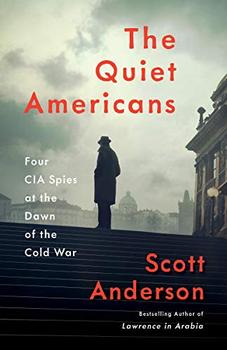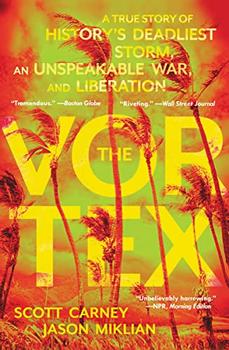Summary | Excerpt | Reviews | Beyond the book | Read-Alikes | Genres & Themes | Author Bio

Four CIA Spies at the Dawn of the Cold War--A Tragedy in Three Acts
by Scott AndersonIn the twilight days of a hot World War II, the emergence of a strange new "cold" war with the Soviet Union, a former ally, pushed American intelligence into a committed battle against the spread of communism. The years between 1944-1956 saw the founding of the Office of Strategic Services (OSS) — the first federal agency in American history tasked with gathering intelligence and conducting covert operations around the world — followed by the Central Intelligence Agency (CIA). Despite its frosty connotations, the Cold War was very hot for those frontline soldier-spies who dedicated their hearts, minds and bodies to a cause that, over time, would creep into blurry realms of moral compromise and disillusionment.
The Quite Americans: Four CIA Spies at the Dawn of the Cold War—a Tragedy in Three Acts by Scott Anderson tells the story of America's shift from a nimble and principled anti-communist stance in the early post-war years to a clumsy and misguided shamble among foreign governments a mere decade later. Anderson creatively focuses his overarching historical narrative on the careers of four secret service operatives — Frank Wisner, Michael Burke, Peter Sichel and Edward Lansdale — to reveal the depths of American involvement in anti-communist espionage operations, while vividly painting the human toll it took.
Despite its exploration of a relatively short 12-year timeframe, Anderson's book is sprawling in scope. From detailed accounts of covert ops in post-WWII Germany and southeast Europe to new intelligence "battlegrounds" in the far-flung jungles of the Philippines and Vietnam, the reader learns how the CIA began to infiltrate sovereign countries to support nascent anti-communist groups or set up new forms of resistance to counter a Soviet Union increasingly more cunning and savvy in its counter-espionage operations. The book's jumping off point is the dapper and urbane Southerner of inherited wealth Frank Wisner, who oversaw spy operations in southeastern Europe during the waning days of the war. He climbed the spy ladder to become the deputy director of the CIA, working tirelessly during the late '40s and early '50s to combat the spread of communism in Eastern Europe through the insertion of intelligence operatives into "enemy" territory, along with propaganda campaigns aimed at demonstrating the appeal of democracy. The failure of America to assist a burgeoning democratic movement in its fight against the communist government in the 1956 Hungarian Revolution — and the civilian bloodbath that ensued — ultimately crushed Wisner's spirit, leading to one of the tragedies hinted at in Anderson's subtitle.
The other three stars of this fascinating spy history are Michael Burke, a former football player and later Hollywood movie scriptwriter; Peter Sichel, a German Jew who escaped the Nazis and eventually established the first CIA foothold in Berlin after the war; and Ed Lansdale, the swashbuckling spy who stamped his imprint on southeast Asia through his "hearts-and-minds" campaign, serving as advisor to key politicians such as Ramon Magsaysay of the Philippines and Ngo Dinh Diem of South Vietnam. Anderson is an engaging storyteller as he recounts each man's personal and professional commitments (and compromises) in a balanced yet sympathetic light.
No such sympathy is saved for those viewed by the author as the "bad guys," however. Coming in for extremely harsh judgment is John Foster Dulles, Secretary of State in the Eisenhower administration, whose hatred of communism blazed hotter than the sun and blinded him to realities on the ground. The conniving and scheming J. Edgar Hoover, head of the FBI, denigrated the CIA and targeted its operatives (including Wisner) at every turn to bolster his own personal fiefdom, and is duly roasted in Anderson's account. Perhaps less deservedly, Anderson skewers Eisenhower himself for listening to Dulles too much and allowing Hoover's shenanigans to go unchecked, while ignoring the steps the president did take to rein in the more rabid among his cabinet.
Toward the end of the book, Anderson brings us back to his overriding argument — that America tarnished its reputation as a defender of freedom in the 1950s. By supporting totalitarian movements and covertly undermining or overthrowing democratically elected foreign governments that might prove troublesome down the road, America abdicated its moral leadership. What makes his case most persuasive are the experiences of the four CIA spies who lived on the front lines and saw the results on the ground. The author draws from their written and verbal accounts, which are detailed, damning and tragic in the sense of what could have been. The Quiet Americans is a riveting testament to those early Cold War warriors who put their lives on the line for a mission that eventually lost its meaning in the frenetic overreach of American foreign affairs.
![]() This review was originally published in The BookBrowse Review in November 2020, and has been updated for the
June 2021 edition.
Click here to go to this issue.
This review was originally published in The BookBrowse Review in November 2020, and has been updated for the
June 2021 edition.
Click here to go to this issue.

If you liked The Quiet Americans, try these:

by Scott Carney , Jason Miklian
Published 2023
The deadliest storm in modern history ripped Pakistan in two and led the world to the brink of nuclear war when American and Soviet forces converged in the Bay of Bengal.

by Ben Macintyre
Published 2021
The "master storyteller" (San Francisco Chronicle) behind the New York Times bestseller The Spy and the Traitor uncovers the true story behind the Cold War's most intrepid female spy.
If there is anything more dangerous to the life of the mind than having no independent commitment to ideas...
Click Here to find out who said this, as well as discovering other famous literary quotes!
Your guide toexceptional books
BookBrowse seeks out and recommends the best in contemporary fiction and nonfiction—books that not only engage and entertain but also deepen our understanding of ourselves and the world around us.